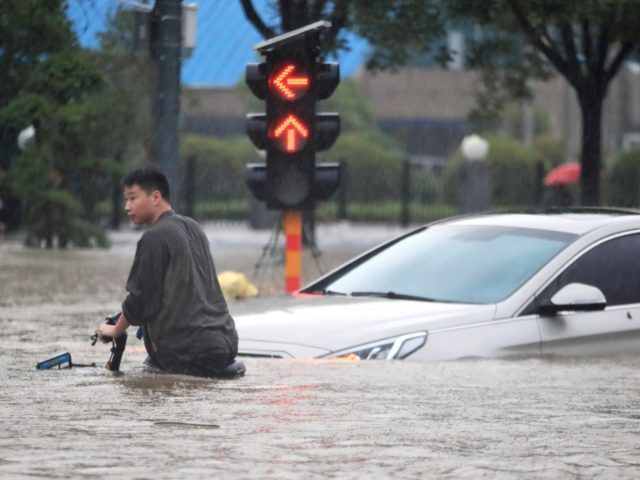Chinese state media on Thursday celebrated the “civilian heroes” who rescued each other during the devastating Henan Province floods, ignoring complaints about the confused and inadequate response of Chinese officials and the disastrous planning decisions that made crowded Henan so vulnerable to flooding.
Flood survivors are telling foreign reporters and social media about failed warning systems, bizarre decisions to keep subways running even as they filled with water, and officials who had to be shown live video of trapped passengers to be convinced they were still alive.
China’s state-run Global Times only wanted to talk about the “civilian heroes” hashtagged in social media posts tolerated by Chinese Communist Party (CCP) censors, while eyewitness accounts that made the authorities look callous or incompetent mysteriously disappeared:
“Nothing can knock down the heroic Chinese people,” said Chen Zheng, a 42-year-old Zhengzhou resident who helped save a drowning woman in a flooded puddle on Wednesday. He and five other people formed a “human string” holding hands, and pulled the woman out of danger after 10 minutes.
One veteran soldier surnamed Wu, who the Global Times reporter met in a rescue site in Zhengzhou, said even though his own house was flooded as well, he still decided to join the rescue team.
The 50-year-old man was an honorary title recipient in the 1998 flood fight. “I stayed in Hubei for a whole month then. Now I finally have the opportunity to make contribution to my hometown when it is in danger,” he said.
The Global Times celebrated Communist Party members who sandbagged swelling rivers and applauded “unsung heroes” who rescued a pregnant woman trapped in her house without water and power for 24 hours. The state paper even spun the complaints flooding Chinese social media as clever Henan residents using innovative methods to signal volunteer groups for help.
Another Global Times piece noted the subway company in Henan’s capital city of Zhengzhou is facing “controversy” for “what some said was a slow response and ‘delayed’ statement on subway flooding which trapped more than 500 passengers and killed 12.”
The Global Times repeatedly stressed how “rare,” “extraordinary,” and “unprecedented” the rains have been this week but grudgingly admitted that irate Zhengzhou residents want subway officials investigated for failing to suspend underground rail service during the storm when flooding of the tunnels was a fairly obvious danger. The subway company has not been forthcoming about who made the decision to keep the system running.
On Friday, the Global Times reported that rain had subsided enough to allow Zhengzhou to “clean up debris and mud” while heavy rains continued to pound the rest of Henan province.
“Zhengzhou is still struggling to resume full electricity supplies, and some people are still stranded due to sporadic inundations, while the rainfall late Wednesday worsened the situation somewhat,” the report said.
The Friday piece again congratulated local “netizens” for relaying “unfamiliar names of counties, townships and villages online for frontline rescuers, many of whom have been working around the clock.”
People’s Liberation Army (PLA) units are also moving in to assist an area facing “high risks of flash floods and landslides” from nearby mountains.
The Global Times noted that while rural Henan is more vulnerable to blackouts and spotty phone service that make it “difficult to make contact with stranded people,” smaller cities and towns appear to be handling the flood disaster better than massive Zhengzhou, in part because expansive croplands are better able to absorb the rainfall and become natural reservoirs.
“Efficient forecasts and early warning mechanism, quick evacuation and close monitoring of water bodies are required to minimize damages and casualties in the future,” said “observers” quoted by the Global Times, raising the question of why such resources were not already available in an area noted for seasonal flooding.
According to “urban management experts” cited by the article, “the biggest lesson learned this time is that not enough attention was paid to rainstorm red alerts issued by weather forecast departments.”
“Despite the unprecedented natural disaster [that] could overwhelm almost any city’s drainage system, it has also prompted debate on how to better prepare for risks,” the Global Times allowed.

COMMENTS
Please let us know if you're having issues with commenting.